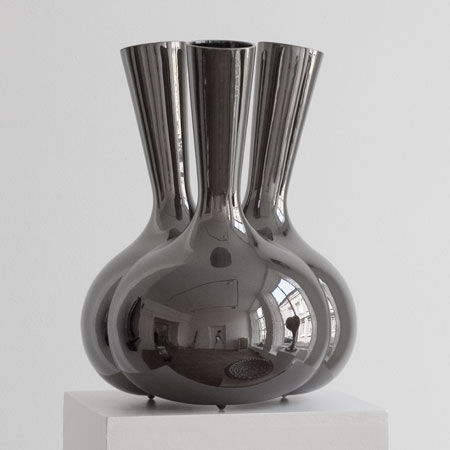Design Miami 08: Dutch designer Roderick Vos will present a collection of three ceramic pieces called White Gold at Design Miami this week.
The pieces have been produced in a limited edition of 25 by ceramic manufacturers Koninklijke Tichelaar Makkum for Dutch gallery Priveekollektie. Top image: Ma-Ma’ vase. Above: Bloom vase
Above: Atlantis. The following text is from Roderick Vos:
--
‘White Gold’
Atlantis, Bloom & Ma-Ma
The latest Ceramic 'White Gold series', are 3 dutch design icons produced by Koninklijke Tichelaar Makkum, realised in a limited edition of 25 pieces. This is the latest designer's studio edition, specially made for the 'Priveekollektie' by designer Roderick Vos.
This bowl with a 45 cm diameter, is named after the myth of Atlantis. The theme for these ceramic objects was inspired by the evolutionary shapes of nature. An emphasis of a repetition of structure like those on coral for example, was laid on in these designs.
The repetition of curves in this seemingly craft, were developed with very high-tech advanced Cad Cam programs and used to create a ‘mother form’ for a casting-mould. By rotation, division and reflection the Atlantis came to existence.
This project finally resulted in a wonderful but very complex basic shapes which is partially due to the highest technological knowledge of Royal Tichelaar Makkum, its producer.
The ‘Ma-Ma’ & Bloom vase, for example, is a unique design by Roderick Vos, for which he allowed himself to be inspired- again- by the wonders of nature. In fact, the form of the Ma-Ma vase can be traced to the origins of mankind – how a single organism can give the impetus for three others to grow. An amazing vase!
The fascinating basic forms from nature are, for Roderick Vos personally, often surprising in their apparent simplicity and beauty. Thus, the design of the Ma-Ma vase and Bloom vaze is inspired by ‘biological structures and cell divisions’.
During the design process, the point of departure was a vase form symmetrical when turned. Thus, the form has been, as it were, ‘adversely affected’. The new vase form was created when the basic form was repeatedly divided, after which the leftovers were copied and merged in another manner.

